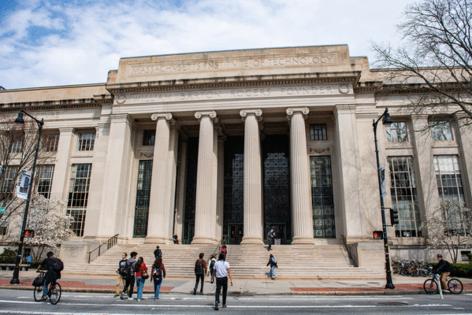Trump offers all colleges preferential funding plan rejected by MIT
Published in Political News
WASHINGTON — The Trump administration is inviting all U.S. colleges to participate in a compact — initially rejected by the Massachusetts Institute of Technology — that would grant preferential federal funding in return for commitments to specific policy changes like DEI bans, according to a person familiar with the matter.
The White House sent its Compact for Academic Excellence in Higher Education, designed in part by Apollo Global Management Inc. co-founder Marc Rowan, to nine colleges earlier this month, asking for feedback. A few days after MIT rebuffed the proposal, the administration extended the offering to all higher education institutions, according to the person, who asked not to be identified discussing internal policies.
The move expands President Donald Trump’s latest pressure tactic beyond the relatively small circle of elite colleges and research universities that have so far been his administration’s targets. The person familiar said that a number of schools had reached out to express interest in the agreement, though they declined to name them.
“Higher Education has lost its way, and is now corrupting our Youth and Society with WOKE, SOCIALIST, and ANTI-AMERICAN Ideology,” Trump posted Sunday on Truth Social. “My Administration is fixing this, and FAST, with our Great Reform Agenda in Higher Education.”
So far, interest in the compact appears relatively muted.
The first group of universities invited to give feedback and sign on were MIT, the University of Pennsylvania, the University of Virginia, the University of Arizona, the University of Texas Austin, the University of Southern California, Vanderbilt, Dartmouth and Brown.
MIT rejected the deal on Friday, calling it “inconsistent with our core belief that scientific funding should be based on scientific merit alone.”
Leaders at the remaining eight colleges are still mulling their responses, according to officials at the schools. While those colleges have yet to formally reject or accept the compact, the presidents at Penn and UVA have signaled that they’d be unlikely to agree to the proposal in its current form.
Trump has said that colleges who reject the deal will face investigations into compliance with federal laws, but the extent to which federal research grants or student aid eligibility will be predicated on acceptance of the accord remains murky.
‘Sign of defiance’
Ken Marcus, who served as assistant secretary for civil rights at the Education Department during Trump’s first term, said refusal would almost certainly be seen as a “sign of defiance” by administration officials, and colleges should expect heightened federal scrutiny.
“Any university that refuses this once-in-a-lifetime opportunity to transform higher education isn’t serving its students or their parents – they’re bowing to radical, left-wing bureaucrats,” Liz Huston, a White House spokeswoman, said in an email after MIT rejected the compact.
According to the person familiar, the administration still plans to meet with officials from colleges to take their feedback and incorporate it into an updated version of the compact that they’ll send to interested schools.
Christopher Rufo, the conservative activist who kick-started the anti-DEI movement and has been influential in shaping the Trump administration’s education policy, has long advocated for a universal and enforceable federal contract akin to what the compact would accomplish.
“I think the president should just impose it as a condition,” he told Bloomberg in July. “There has to be a point where there’s a general, blanket policy.”
Major contractors
If a critical mass of schools decide that the benefits of federal funding are worth the downsides of agreeing to government enforcement, the compact could create a bifurcated higher education system.
Colleges that agree to the deal may see their research funding balloon, giving them more resources to compete for students, hire faculty and expand program offerings. Those that don’t could be forced to shrink their operations if grant money slows to a trickle, or rely on their institutional coffers to fill the gaps — which the vast majority of universities cannot afford.
“These institutions are major federal contractors,” said Brendan Cantwell, a professor at Michigan State University who studies the political economy of higher education. “If suddenly there’s uncertainty around this huge part of the budget — and it could be a third or half of the budget – then it makes a lot of sense that they’d have to shift spending and cut costs.”
_____
©2025 Bloomberg L.P. Visit bloomberg.com. Distributed by Tribune Content Agency, LLC.
























































Comments